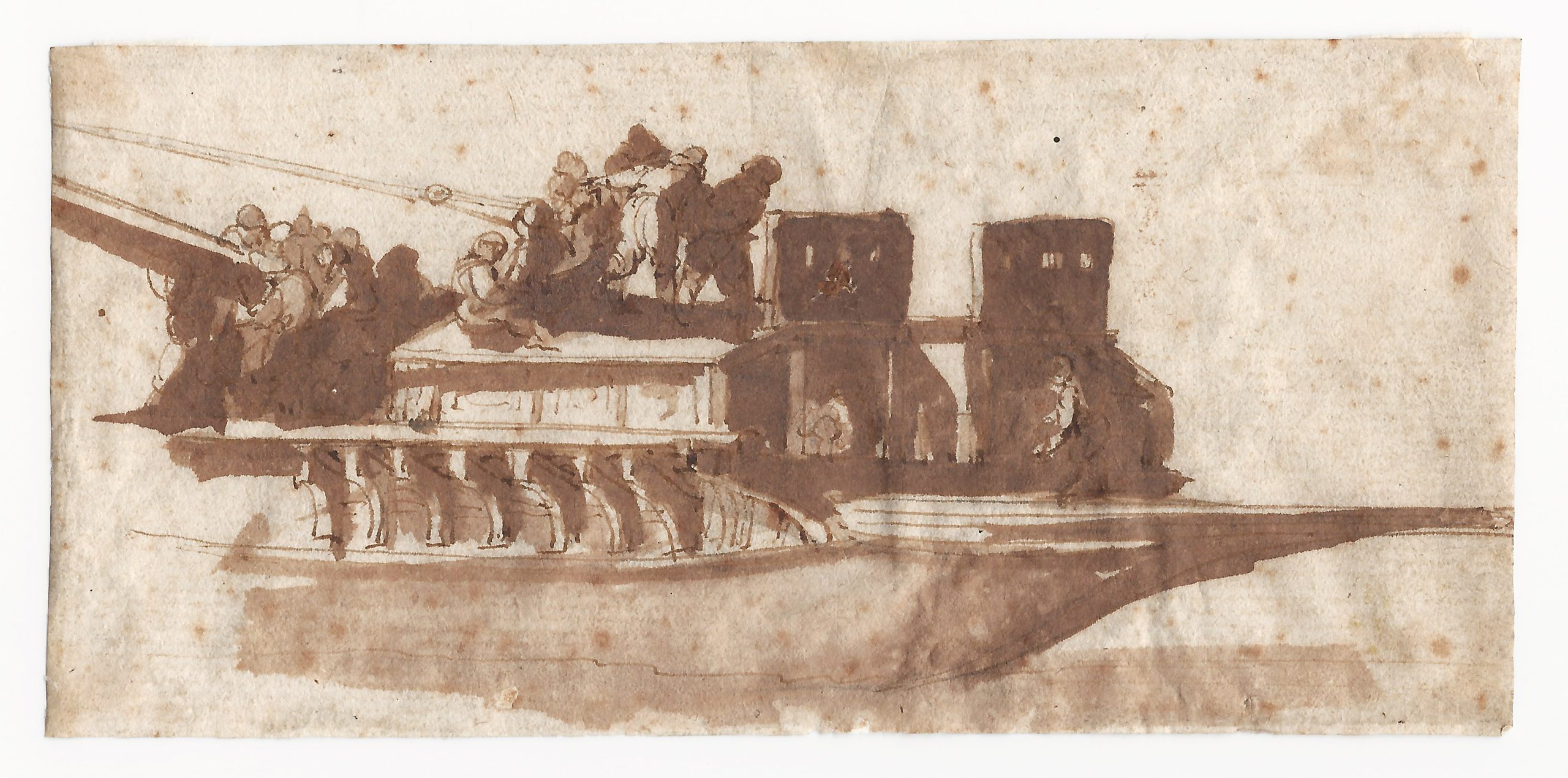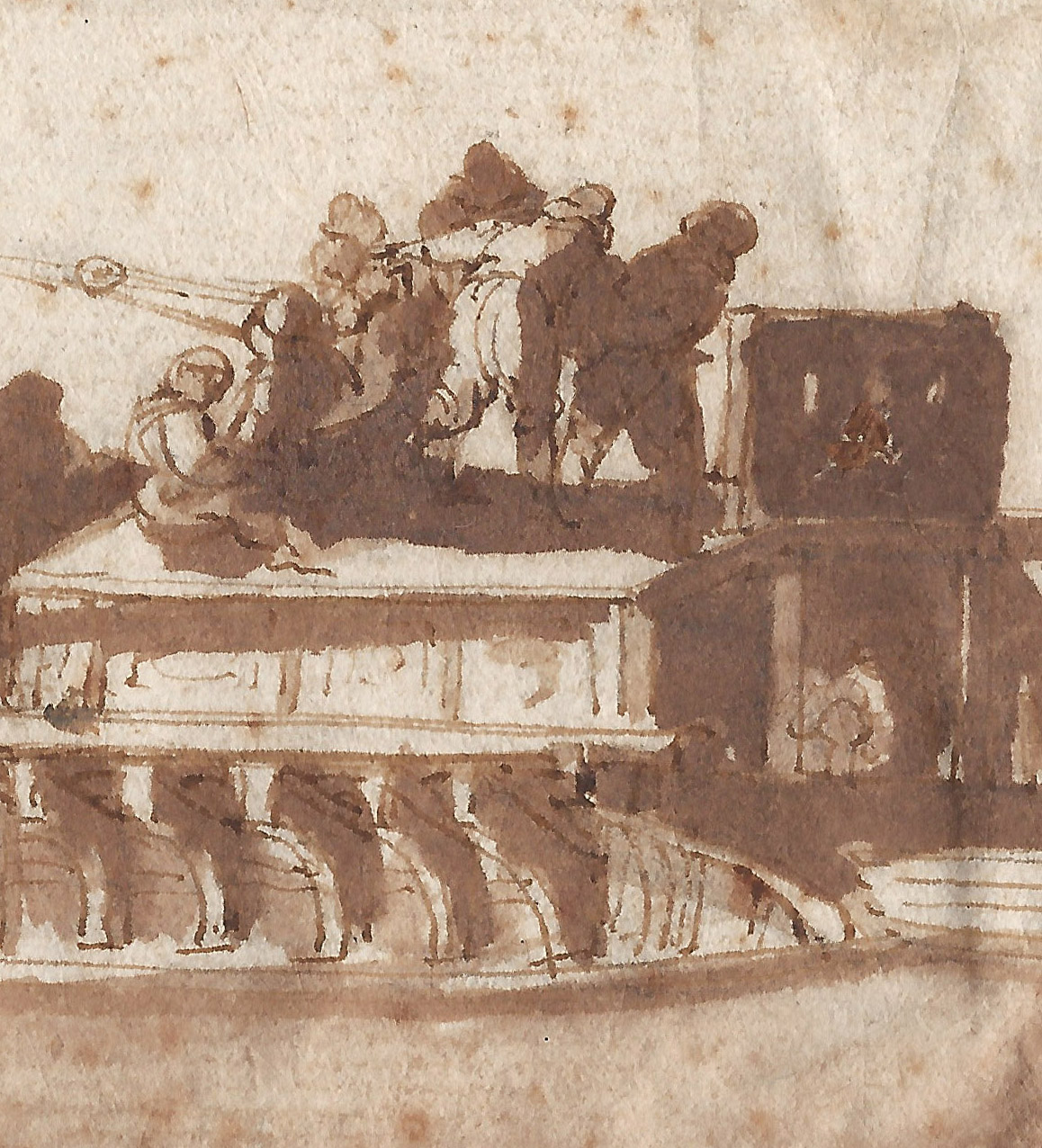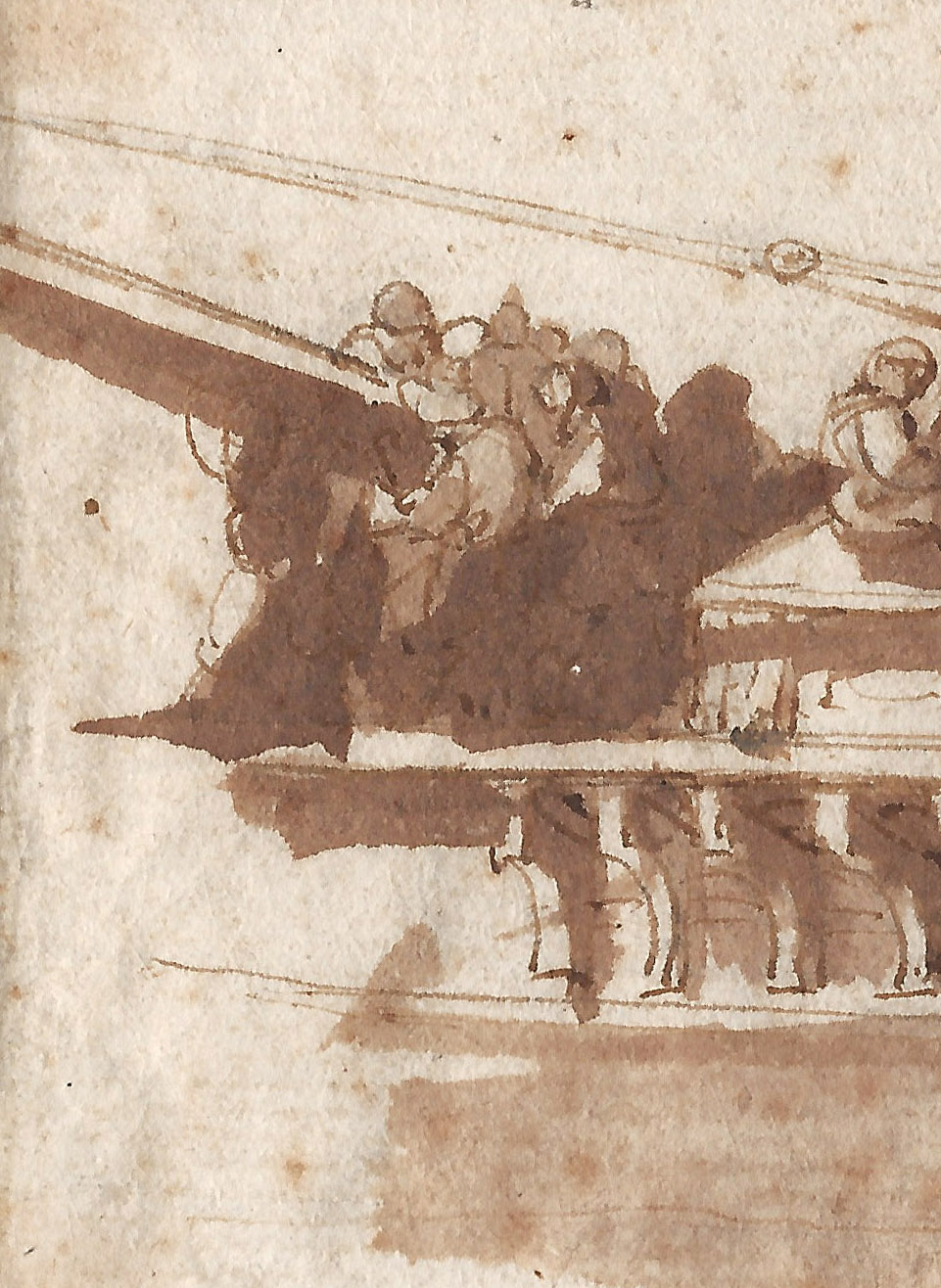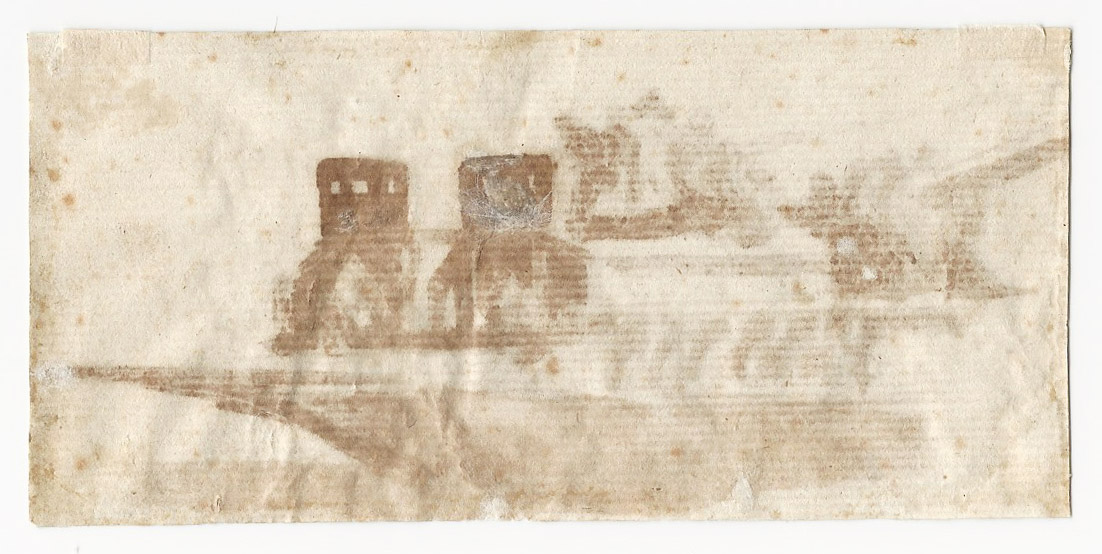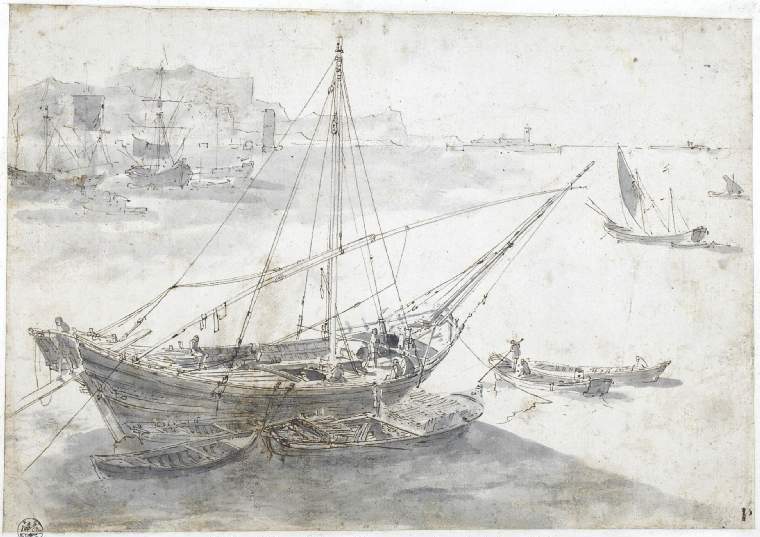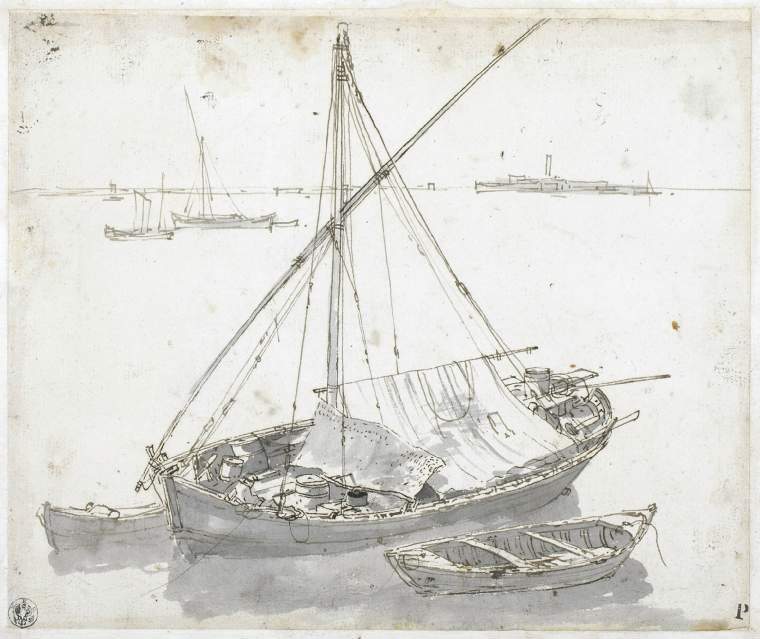ABRAHAM CASEMBROOT (Bruges? c. 1593 – 1658 Messina)
Abraham Casembroot (Bruges? c. 1593 – 1658 Messina)
Shipmates Raising a Mast
Traces of graphite, pen and brown ink, brown wash, 62 x 132 mm (2.4 x 5.2 inch)
Provenance
~ Probably the sculptor Bartolommeo Cavaceppi (c.1716–1799), Rome
~ Michelangelo Pacetti (1740–1820), Rome, whose collection purchased en bloc in 1844 by Dr Waagen for:
~ Kupferstichkabinett der Staatliche Museen, Berlin, until deaccessioned in September 1936
~ With Colnaghi’s, London, where purchased by:
~ Sir Bruce S. Ingram (1877–1963), London
~ Carl Winter (1906–1966), Director of the Fitzwilliam Museum, Cambridge
~ With dealer Bernard Houthakker, Amsterdam, in 1965
~ Private collection, Amsterdam, until 2017
***
This small yet vigorous sketch belongs to a group of drawings depicting ships and harbour scenes that was owned in the middle of the eighteenth century by the Roman sculptor Bartolommeo Cavaceppi (c.1716–1799), and was purchased in 1844 by the Staatliche Museen in Berlin.1 Upon deaccessioning by the Berlin museum the group has been dispersed, with some sheets now in the Fitzwilliam Museum, Cambridge,2 and others in private collections.3
Although all drawings were given to Adriaen van der Kabel (Rijswijk 1630/31–1705 Lyon) by Bock and Rosenberg in their catalogue of the holdings of the Berlin museum, in 1973 the art historian Hans Mielke discovered stylistic similarities between the ex-Berlin sketches and a preliminary study for an etching by Abraham Casembroot, upon which the whole group was given to Casembroot by both the Fitzwilliam Museum and the Rijksbureau voor Kunsthistorische Documentatie (RKD).4 Some of the Fitzwilliam studies have since been idenfitied as studies for other etchings by Casembroot. Recently, one or two sheets from the Fitzwilliam group have been attributed to Bonaventura Peeters I (Antwerp 1614–1652 Antwerp).5 Peeters is however less likely as draftsman as he is not known to have travelled to Italy, while the drawings in the group obviously depict Italian scenes drawn from nature and were in Italy at least by the middle of the eighteenth century.
Abraham Casembroot was born in or before 1593, possibly in Bruges, in the Southern Netherlands, although he may also have been of Northern Netherlandish descent.6 Casembroot lived in the east-coast port of Messina from 1623, where for the last nine years of his life he held the post of Consul for the Dutch Republic, sending detailed reports of local affairs to The Hague. Information about his life can be found in biographies of Messina artists, with the most detailed account given by Francesco Susinno in his Vite de' pittori messinesi of 1724, although later Vite of Messina artists also devote a comparatively large amount of space to Casembroot. As a painter he was evidently held in considerable esteem in Messina, where he had five local pupils. Casembroot specialised in harbour and marine views and tempests; according to the Vite his paintings were much in demand in both Sicily and the Netherlands. The well-known seventeenth-century collection amassed by Don Antonio Ruffo of Messina boasted no fewer than ten works by Casembroot, one of which was very likely the large canvas The Swordfish Catch, now in the Museo di San Martino in Naples. One of Casembroot’s consular duties was to deal with the ship that in all probability had on board Rembrandt’s painting of Aristotle, commissioned by Ruffo.
Compared with Casembroot’s paintings, his etchings and drawings exhibit more obvious personal stylistic characteristics, which Mielke had already observed in the nervous lines and the distinctive manner in which the small human figures are depicted. Mielke also demonstrated that Van der Kabel made use of drawings by Casembroot for his own etchings, and he is quite likely to have owned drawings by Casembroot, which may have caused the original attribution of the group to Van der Kabel. Casembroot’s best-known work is a series of etchings of views of Messina and the surrounding countryside which he dedicated to the collector Lucas van Uffelen.
Stylistically our drawing may be compared to several of the Fitzwilliam drawings, including a Lagoon Scene (see fig.) and the Lateen Rigged Ship in a Port (see fig.).7
1. E. Bock and J. Rosenberg, Staatliche Museen zu Berlin: die niederländischen Meister: beschreibendes Verzeichnis sämtlicher Zeichnungen mit 220 Lichtdrucktafeln, Berlin 1930, no. 13874. (under Adriaen van der Cabel), pp. 105-06, nos. 12586-12607 and 12610-12630 and Plate CVII.
2. Fitzwilliam Museum, Cambridge, among others inv. nos. PD.1963.221 and PD.1963.222; see D. Scrase, The Golden Century; Dutch Master Drawings from the Fitzwilliam Museum, exh. cat. Cambridge / Munich 1995-96, cat. no. 53 (as attributed to Abraham Casembroot).
3. Sotheby’s, London, 27 June 1974, lots 194 and 201 and Sotheby’s, New York, 25 January 2006, lot 2 (as Abraham Casembroot).
4. See A. Beunen, ‘Abraham Casembroot, een Nederlandse schilder in het Sicilië van de zeventiende eeuw’, Oud Holland 109 (1995), pp. 32-62.
5. http://data.fitzmuseum.cam.ac.uk/id/object/4407
6. For the arstist, see Beunen, op. cit., and R. De Gennaro, ‘Un fiammingo a Messina: Abraham Casembrot’, Prospettiva, No. 93-94, January-April 1999, pp. 189-99.
7. Respectively pen and brown ink, grey wash, 209 x 255 mm, inv. no. PD.1963.222. and pen and brown ink, grey wash, 209 x 297 mm, inv. no. PD.1963.221.
